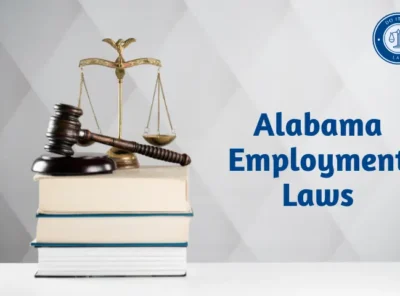Alabama Labor Laws: What You Need to Know
Alabama Labor laws regulate issues like wages, breaks, leave, hiring practices, and more for employees across the state. Understanding your rights under Alabama employment laws is crucial as a worker. This comprehensive guide will explain key aspects of Alabama labor regulations so you can ensure you are treated fairly.
Alabama’s wage and labor laws primarily follow federal standards set by the U.S. Department of Labor. This means there’s no separate state minimum wage or overtime law for adults. However, it’s still important to understand the key provisions of relevant federal laws and how they apply to workers in Alabama.
Here are some key aspects of Alabama wage and labor law:
Minimum Wage:
- Federal minimum wage: $7.25 per hour.
- Tipped employees: Minimum wage of $2.13 per hour, with tips making up the difference to reach the federal minimum of $7.25.
- Workers under 20: $4.25 per hour for the first 90 days of employment.
Overtime:
- Overtime pay of 1.5 times the regular rate required for all hours worked beyond 40 in a workweek.
- Certain exemptions apply for specific occupations like executives, farm workers, and some retail employees.
Who Alabama Labor Laws Apply To
Most Alabama labor laws cover all employees, but some regulations only pertain to certain workers or industries. Key factors determining coverage include:
Covered Employees:
- Full-time and part-time employees: Whether you work 40 hours a week or just a few hours a month, you’re generally covered by most wage and hour laws.
- Salaried employees: Even if you receive a fixed salary instead of hourly wages, you’re still entitled to overtime pay if you meet the criteria (working over 40 hours per week in most cases).
- Temporary and seasonal workers: These workers are also entitled to the same labor protections as permanent employees.
- Minors: Alabama child labor laws have specific regulations and restrictions on the types and hours of work allowed for minors under different age groups.
Exceptions and Exemptions:
- Independent contractors: Individuals working as independent contractors, not under the direct control of an employer, are generally not covered by traditional labor laws.
- Volunteers: True volunteers who work without expectation of compensation are not included under labor laws.
- Certain occupations: Some specific professions, like executives, farm workers, and some retail employees, may have exemptions from certain provisions of overtime or minimum wage laws.
Determining your Coverage:
If you’re unsure whether you’re covered by Alabama labor laws, consider these factors:
- Control and supervision: Does your employer control your work schedule, tasks, and methods?
- Financial dependence: Do you rely on wages or salary from your employer as your primary income?
- Benefits: Are you provided benefits like health insurance or paid leave by your employer?
While most Alabama workers are protected by basic wage, leave, and discrimination laws, the specifics can vary. Consulting the text of each law is the best way to determine coverage as an employee or employer.
Key Provisions of Alabama Labor Laws
Alabama has enacted extensive regulations across a wide range of employment issues. Here are some of the key provisions workers and companies need to know:
Minimum Wage
- The state minimum wage in Alabama matches the federal $7.25 per hour for most employees.
- Tipped employees must earn at least $2.13 per hour in direct wages if their tips supplement that up to minimum wage.
- There are no local minimum wage rates in Alabama that exceed the state level.
Overtime Pay
- Overtime pay of 1.5 times the regular rate is owed for over 40 hours worked in a week.
- Some exemptions from overtime apply under state law for certain types of employees.
- Alabama does not require daily overtime pay, just weekly.
Meal and Rest Breaks
- Alabama law does not mandate meal or rest breaks for adult employees.
- An employer policy can set voluntary break allowances.
- Minors have special break requirements under child labor regulations.
Leave and Paid Time Off
- Alabama does not require paid vacation, sick leave, or holidays for employees.
- The state only mandates unpaid leave for certain purposes like jury duty, voting, military service, domestic violence, etc.
Pay Stub Information
- By law, employers must provide itemized pay statements displaying hours worked, rates paid, deductions, and net pay.
- Employees must receive pay stubs on payday covering the prior pay period.
Termination Notice
- Alabama is an at-will employment state, so no notice is required for termination without cause.
- Employers often voluntarily provide severance pay or notice periods.
- Advance notice is required for certain types of terminations like mass layoffs.
Child Labor
- Strict hourly limits and occupation restrictions apply to minor employees under the age of 18.
- 14-15 year olds can only work limited weekday and weekend hours.
- Underage workers require work permits and proof of age documentation.
These represent some of the major regulations that Alabama employers must follow and employees should understand. Specific details, exceptions, and provisions may apply in any given case.
Penalties for Violating Alabama Labor Laws
Failing to comply with Alabama labor regulations can result in civil and criminal penalties:
- Back pay – Employees can recover owed wages, overtime, tips, commissions, and benefits.
- Fines – Alabama levies fines against employers per violation, such as up to $1000 per employee for lacking work permits.
- Private lawsuits – Employees can sue for compensation, reinstatement, damages, legal fees, and more.
- Tax penalties – Violations like misclassifying employees can lead to tax liability.
- Revocation of licenses – For licensed industries like construction, violations can mean suspended licenses.
- Imprisonment – Criminal charges may apply for offenses like wage theft or child labor infractions.
Additionally, government agencies like the Alabama Department of Labor can investigate complaints and order employers to come into compliance through measures like audits, warnings, administrative hearings, and corrective actions.
Recent and Proposed Changes to Alabama Labor Laws
Like other states, Alabama periodically updates its employment laws or considers new legislative proposals to address changing realities in the workplace. Some recent examples include:
As of October, 2023, there haven’t been any major recent changes to Alabama’s core labor laws like minimum wage or overtime requirements. However, there are some ongoing developments and proposed changes worth noting:
Recent Developments:
- Overtime Tax Exemption: A temporary law passed in 2023 exempts overtime pay (hours worked over 40 in a workweek) from state income tax until June 30, 2025. This provides some relief for workers earning overtime pay.
- Workplace Safety Updates: Several new laws focused on improving workplace safety, like stricter regulations for crane and hoist operations, took effect in January 2024.
- Minimum Wage Debate: While no official changes have been made, discussions and proposals to raise the minimum wage in Alabama continue, with some pushing for a gradual increase towards the federal level of $15 per hour.
Proposed Changes:
- Paid Leave: Some proposals advocate for introducing mandated paid sick leave or family leave benefits for employees in Alabama. These proposals are still in early stages of discussion and haven’t gained significant traction yet.
- Independent Contractor Classification: Concerns about misclassification of employees as independent contractors to avoid labor law protections have led to potential changes in this area. Legislative proposals seeking clearer definitions and stricter regulations are under consideration.
- Apprenticeship Programs: Initiatives focusing on expanding and promoting apprenticeship programs for skilled trades are gaining momentum, potentially leading to changes in existing regulations and funding allocations.
Overall:
- While no major changes have been implemented recently, the landscape of Alabama labor laws is evolving.
- Discussions and proposals regarding minimum wage increases, paid leave mandates, independent contractor classification, and apprenticeship programs are ongoing.
- Staying informed about these developments and seeking guidance from relevant authorities or legal professionals is crucial for both employers and employees to navigate the evolving legal landscape.
Alabama typically enacts fewer and less progressive employment law reforms compared to other states. But going forward, growing public support for worker protections could spur additions or amendments to modernize Alabama labor regulations.
Key Controversies and Challenges Around Alabama Labor Laws
Labor law debates often spark controversy in Alabama as in other states. Key disputes involve:
- Minimum wage – Critics argue the state minimum is too low and disadvantages lower-income workers. Proponents counter it allows flexibility for businesses.
- Right-to-work status – Unions criticize right-to-work limits on dues collection while business groups favor the policy.
- Exemptions – Carve-outs for some workers from overtime and minimum wage remain controversial.
- Banning local labor laws – Alabama prohibits local minimum wages, leading progressives to accuse the state of blocking communities from setting better standards.
- Limited protections – Alabama lags behind national trends on rights like paid leave, fair scheduling, and equal pay that advocates demand.
- Weak enforcement – Some allege state agencies do not proactively or aggressively enforce labor regulations compared to other states.
Alabama is unlikely to pursue aggressive expansions to worker protections, given its conservative-leaning and predominant right-to-work policies. However, the baseline of existing Alabama labor laws still provides important guarantees for employees that should be understood.
Key Takeaways on Alabama Labor Laws
Alabama labor regulations cover all the central protections like minimum wage, overtime, leave, pay rules, and youth employment standards. However, Alabama law is less progressive than some states in areas like paid leave, scheduling, and local minimum wages.
Workers should learn their core rights under both federal and Alabama state labor laws. If an issue arises, the Alabama Department of Labor can provide guidance, accept complaints, and investigate violations. Employers likewise must ensure they remain fully compliant in their policies, practices, and treatment of employees.
Staying up to date on changes in Alabama labor regulations is also essential. While major reforms may be modest given the political climate, new precedents and mandates can still impact employers and employees. With a proper understanding of the laws, workers, and businesses can help foster fair and lawful workplaces.












